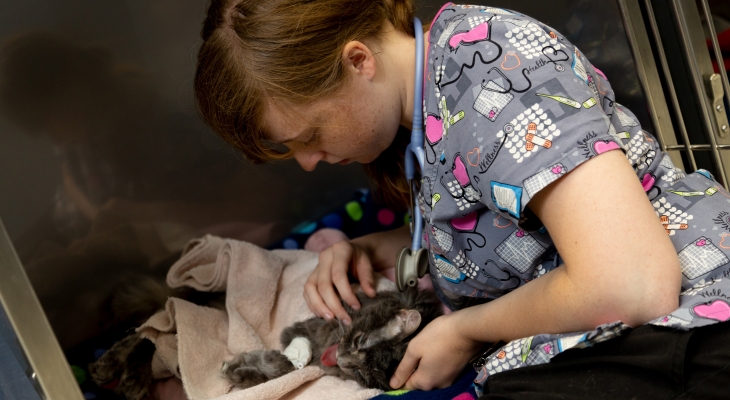
Nursing Program Information Session
Learn more about transfer opportunities at JJC! Begin your academic pathway at JJC and transfer to a four-year institution of your choice. There are several ways to transfer!
What does it mean to transfer? Transferring is the act of moving from one school to another. Students may transfer to and from a variety of schools: community college to university, community college to community college, university to community college, or university to university.
There is more than one way to transfer! We offer transfer programs through our University Partnerships department that can help you, the student! University Partnerships has contracted agreements with a number of schools to offer benefits above and beyond a traditional transfer path. For example, our four-year partners may offer a locked-in tuition rate, additional scholarships, or additional accepted transfer credit. You can find a list of our current partners and programs on our University Partnerships webpage.
University Partnerships is home to the University Center; this is a space on the Romeoville campus. Here, JJC students can meet with admission representatives from our partner universities and learn all about transfer options. You can find a list of our partner schools currently utilizing the space on the University Center webpage.
You can find additional transfer options below, under Transfer Resources.
Check out the Transfer Events page for a calendar of transfer events, including a schedule of college and universities table visits: Transfer Events
You may want to connect with different transfer institutions, but where do you start? Who should you talk to and how do you find them? What questions should you ask? The guide below will give you a few tips!
The Associate in Arts (A.A.) degree is a program that involves foundational coursework. A.A. students complete core courses in English, math, science, social sciences, and humanities that are transferrable to a four-year institution.
The A.A. is designed for students planning to pursue a four-year degree program in majors like anthropology, art, business, communication/journalism, communication/public relations, criminal justice, English, history, music, philosophy and religion, political science, psychology, sociology, speech communication, and theater.
Students interested in elementary and early childhood education should follow the A.A. program and use advising to select appropriate courses. Students majoring in secondary education should follow an A.A. or A.S. degree program and supplement it with appropriate education courses.
The Associate in Science (A.S). is a program that prepares students to pursue science-based bachelors degrees. The degree requires general education courses in English, social sciences, humanities, along with introductory and advanced courses in science and math.
The A.S. degree is designed specifically for students planning to pursue a bachelor's degree in agriculture, biology, chemistry, computer science, engineering, mathematics, and physics. All pre-medical, pre-dental, and pre-veterinary medicine degree programs follow the Associate in Science degree in either biology or chemistry.
An Associate of Applied Science (A.A.S.) is a two-year associate-level college degree that focuses on a particular applied science or technical skill. It is designed to meet the needs of students who may want to enter the workforce immediately after graduation.
Although not primarily created for transfer, the A.A.S. degree may be articulated with specific four-year institutions to create a smooth transfer experience where the student can continue on and complete a bachelor's degree.
Certificates are credentials you can earn to help enhance your current career or start a new one. These programs vary in credit hours and give students an option to start working within the field while continuing to earn additional credentials.
Joliet Junior College is a participant in the Illinois Articulation Initiative (IAI). The IAI is an agreement among Illinois colleges and universities to make the transfer of credit as easy as possible. Currently, the IAI allows for the smooth transfer of a set courses, labeled the General Education Core Curriculum among more than 100 participating public and private colleges and universities.
For more information about IAI and the General Education Core Curriculum, please visit the Illinois Transfer portal, iTransfer: iTransfer Home
This is a traditional transfer route. Full-time students complete two years at JJC then transfer to a four-year college or university to complete an additional two years of courses, resulting in a bachelor's degree.
This is a popular program for students, as it is a convenient and cost-effective way to earn your bachelor's degree. Students complete an associate degree at JJC, plus additional courses that will transfer and are required for the four-year degree. Students then transfer to a four-year partner institution and complete the remaining courses required for the bachelor's degree, either online, at Romeoville campus, or at the partner institution's campus. Students may be required to complete as little as one year at the four-year institution.
We offer Associate Degree Plus options for selected academic programs and institutions. You can find a list of all our agreements (listed by transfer pathway or four-year institution) on our University Partnerships webpage.
Dual Degree Partnerships are agreements between the community college and the four-year institution. This agreement allows students to complete their degree at the community college level while planning for their bachelor's degree.
We offer Dual Degree Partnership programs with Governors State University and Roosevelt University. You can find more information about the programs below:
Governors State University: DDP
Guaranteed Admission Programs are created to help promote a seamless transition from JJC into the four-year university. Not all majors are included in these programs, as specialty majors may necessitate additional admission requirements. You can find details about each program below.
DePaul University: DePaul Admission Partnership Program (DAPP)
Elmhurst University: Guaranteed Admission Program
Illinois State University: Redbird Promise
Marquette University: Guaranteed Admission Program
Northern Illinois University: Guaranteed Admission Program
North Cental College: Guaranteed Admission Agreement
Trinity Christian College: Guaranteed Admission Partnership (GAP)
University of Illinois Chicago: Transfer Admission Guarantee (TAG)
If you need help choosing your classes or figuring out your transfer plan, please reach out to our Student Advising Center. You can find details about their services and contact information on their webpage: Student Advising Center
Additionally, you may be ready to reach out to your faculty advisor! Please visit the Major/Pathway Specific Advising page on your student portal for a list of majors and faculty members who can advise you: Major/Pathway Specific Advising
Planning to transfer to a four-year college or university? You can send copy of your official transcripts through our Registrar's Office's website.
Transferring from another college and would like your credits evaluated for a JJC certificate or degree? You will need to complete the Transfer Credit Evaluation form on the Registrar's Office website.
A consortium is a contract between two colleges/universities that recognizes the registration of a student at each site for financial aid purposes. It also certifies that only one of the two colleges/universities will administer Title IV financial aid for the student.
There are several steps of this process to ensure students any eligible financial aid is distributed through JJC or a partner school. Please review this flyer to review these steps.
College Navigator: Free consumer information tool designed to help you research schools and clarify your transfer options
College Scorecard: United States Department of Education website that allows students to sort and filter search results and compare schools based on major, location, tuition, average loan amount, and graduation rates
College Source: A database of over 100,000 college catalogs, institution profiles, and other resources
Illinois Articulation Initiative (IAI): Statewide transfer agreements
Peterson's College Search: Search for schools based on factors such as major, location, and cost
Transferology: An online tool to help identify colleges and universities that will accept your transfer credit
University HQ: Resources provided by an independent education organization to assist students in planning their education and career path
Campus Pride: Links to LGBTQ+ resources at colleges and universities
EduMed: Scholarships and resources for African American students
Hispanic Association of Colleges and Universities (HACU): Over 500 colleges and universities committed to Hispanic higher education success
Historically Black Colleges and Universities (HBCU): List of HBCU by state
RaiseMe: Micro-scholarships for transfer students


The online veterinary medical technology application will be available from March 1 through June 1. The...